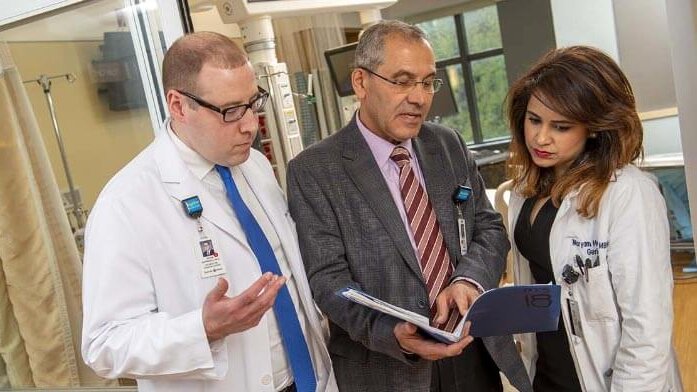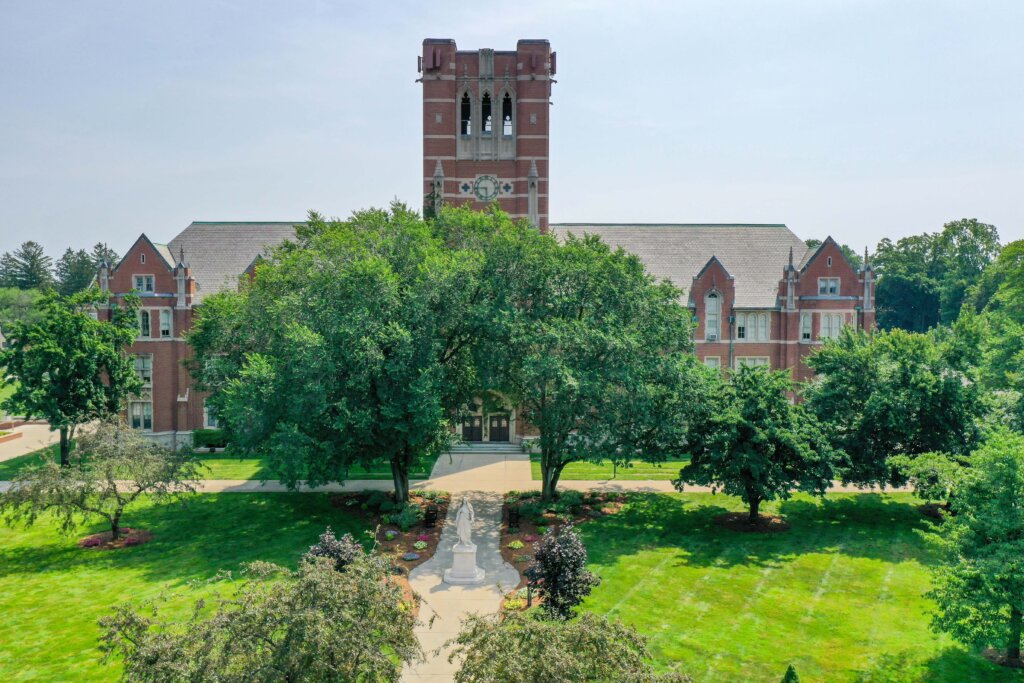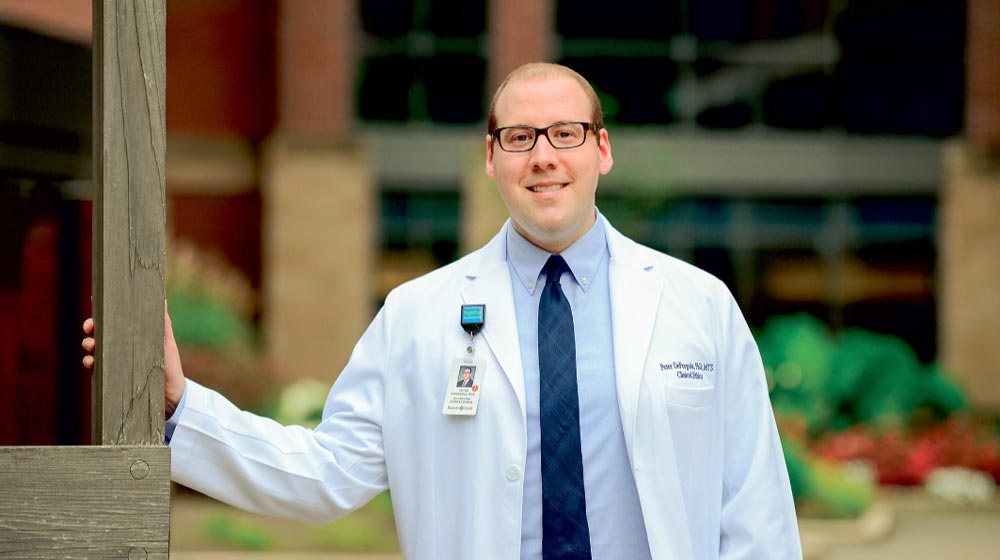Program Overview
Advances in clinical science and biotechnology have created remarkable improvements in patient care, but they have also opened the door to increasingly complex ethical questions. What is the most compassionate way to approach end-of-life care? Can transplanting scarce organs into individuals with substance-use disorders be ethically justified? When is it morally acceptable to manipulate human genomes? How should healthcare professionals navigate parental refusals of life-saving treatments on the basis of religious commitments?
Finding ethically-sound and patient-centered solutions to these complex questions requires specialized skills and competent leaders who are trained to think carefully and critically about life-and-death issues in healthcare delivery.

The Master of Arts in Bioethics and Medical Humanities (MA-BMH) program—which can be completed within one year and offers courses in person, online, or in combination—provides precisely those skills and training. It is geared toward students from a variety of academic and professional backgrounds, both clinical and non-clinical, who are seeking to learn about bioethics and medical humanities and their application to clinical practice.
Whereas bioethics concerns the study of morality as it pertains to life and living things, medical humanities concerns the application of humanities disciplines—philosophy, religion, history, literature, etc.—to the practice of medical science.
The MA-BMH program combines these two distinct yet related fields to create a novel curriculum that is rare among American universities. The result is a state-of-the art, holistic education that combines a rigorous study of the ethical implications of biomedical science with an in-depth, contextual study of the patient as a complete person—with a lifetime of socio-cultural-religious values that can, and often do, run counter to recommended treatments and practices. In this way, the MA-BMH program is less about the biological science of medicine than it is about the moral-biographical art of healthcare delivery.
“The program is first of its kind, not just in Western Massachusetts, but in New England. We are laying the groundwork for something genuinely transformative.”
– Prof. Peter A. DePergola II
Who Should Apply?
Rapid advances in modern medicine mean a greater need for leaders in the field who can think critically about emerging issues involving the treatment of patients. The MA-BMH program is geared toward students from a variety of academic and professional backgrounds, both clinical and non-clinical, who are seeking to learn about bioethics and medical humanities and their application to the practice of healthcare.
The MA-BMH program appeals to traditional students with bachelor’s degrees in humanities, social sciences, natural sciences, or health sciences, as well as to current healthcare professionals with advanced degrees (MA/MS, MSN/DNP, MTS/MDiv/DMin, MBA/MHA/MPA, MSL/MJ/JD, MD/DO, PhD/ThD/DPhil) who are seeking to enhance their primary training.
Program Background
The Master of Arts in Bioethics and Medical Humanities (MA-BMH) degree is a rigorous and enriching academic program offering courses in person, online, or in combination. The MA-BMH helps pre-health students and current healthcare professionals improve skills needed in clinical practice, theoretical research, and academic teaching.
Admission Requirements
The successful applicant will possess:
● A bachelor’s degree (or higher) from an accredited institution.
○ All majors and backgrounds are welcome.
● A completed online application, including (1) official academic transcripts for all degrees held; (2) resume or CV; (3) statement of purpose addressing (i) what draws you to graduate studies in BMH, (ii) the unique perspectives you will bring to the BMH community at Elms College, (iii) the experiences that have prepared you to study BMH at the graduate level, and (iv) your career aspirations upon earning the MA-BMH degree; (4) two letters of recommendation, at least one of which must be from a former or current academic advisor; and (5) application fee.
Standardized test scores are not required for admission to the program. While students are recommended to have completed at least some ethics and/or health science courses, it is not required.
International students may apply with the same materials as US students and, if necessary, submit an English proficiency exam score. International students will also need to provide proof of funding for tuition and living expenses in United States Dollars (USD). International students are not eligible for US government loans, but they may be eligible for certain private loans with or without a US cosigner at private financial institutions.
Degree Completion Requirements
In order to complete the degree:
● Students must maintain a 3.0 GPA or better in the program.
● Students must complete 30 credits of graduate coursework in the time agreed upon by the student and program director.
● All courses must be taken through Elms College unless special provisions are made with the program director.
● Students cannot withdraw from courses unless they are granted a leave of absence by the program director.
Bridge and Credit Transfer Options
Students enrolled in the Undergraduate Minor in Bioethics and Medical Humanities (UM-BMH) and prospective MA-BMH students with prior graduate coursework in BMH or a BMH-adjacent field are eligible to transfer credits into the MA-BMH program.
Full-time UM-BMH students who complete program requirements at the undergraduate level are eligible to transfer up to six credits into the MA-BMH program with the permission of the program director.
Full-time UM-BMH students are also able to complete program requirements at the graduate level free of additional charge. Up to six credits of courses taken at the graduate level are eligible to be transferred into the MA-BMH program.
Prospective MA-BMH students with prior graduate coursework in BMH or a BMH-adjacent field may transfer up to nine (and, in special circumstances, twelve) credits into the MA-BMH program with the permission of the program director.
Track Options
MA-BMH students will select one of two tracks for their course of study: general or clinical. Students who wish to pursue careers in research, teaching, and/or industry but not clinical practice in BMH should enroll in the general track. (Note: Students in the general track are able, but not required, to take courses in the Clinical and Organizational Rotations in Ethics [CORE] program.)
Students who are interested in clinical practice in BMH should enroll in the clinical track. (Note: Students who enroll in the clinical track are also eligible for non-clinical careers in research, teaching, and/or industry.)
Students who enroll in the clinical track are required to enroll in and complete the CORE\ program. Such students are recommended, but not required, to take at least one of the following courses prior to taking courses in the CORE program.
● BMH 5300: Clinical Bioethics
● BMH 5310: Organizational Ethics in Healthcare
● BMH 5325: Neonatal and Pediatric Bioethics
● BMH 5330: Critical Care and End-of-Life Ethics
Concentration Option
MA-BMH students may choose to concentrate in Catholic Bioethics and Medical Humanities by enrolling in at least three of the following courses and writing the corresponding research essay in each course on a topic specifically related to Catholic Bioethics and Medical Humanities.
● BMH 5011: Philosophy of Death and Dying
● BMH 5160: Bioethics, Disability, and Human Rights
● BMH 5200: Comparative Religious Bioethics
● BMH 5210: Philosophy of Pain and Suffering
● BMH 5250: Genetic and Reproductive Ethics
● BMH 5320: Religion and Medicine
● BMH 5325: Neonatal and Pediatric Bioethics
● BMH 5330: Critical Care and End-of-Life Ethics
● REL 5400: Spirituality in Healthcare
● REL 5504: Life and Death Decisions in Catholic Thought
Clinical and Organizational Rotations in Ethics (CORE) Program
MA-BMH students may elect to enroll in the Clinical and Organizational Rotations in Ethics (CORE) program offered by the Office of Clinical and Organizational Ethics at Baystate Health/UMass Chan Medical School – Baystate (BH/UMCMS-B), which is less than five minutes from the Elms College campus. The CORE program provides students with an experience-based internship to learn the requisite scholarly and professional skills necessary to navigate complex healthcare ethics consultations in a supervised, guided manner.
CORE interns focus on integrating clinical, organizational, and professional ethics across a large academic healthcare system. The program also provides students with a robust and substantive apprenticeship to undertake clinical and organizational ethics consultations, including active participation in the pre-consultation phase.
CORE interns are intensely supervised at BH/UMCMS-B. Duties of CORE interns include, but are not limited to, professional ethics education for healthcare personnel, clinical and organizational ethics research, policy review and/or development on ethical issues, and prospective and retrospective case consultation.
Each 3-credit CORE internship requires approximately 150 hours of work in the Office of Clinical and Organizational Ethics at BH/UMCMS-B.
Typically, CORE internships may be initiated after completion of 15 credit hours of coursework. The CORE program adopts an integrated ethics approach, as developed by the Veterans Health Administration, to implement the Core Competencies for Clinical Ethics Consultation of the American Society for Bioethics and Humanities.
Capstone Experience
The MA-BMH Capstone course is an intensive and immersive research experience that offers students the opportunity to identify, investigate, analyze, write about, and present on advanced topics in bioethics and/or medical humanities. It guides students from a broad interest in general topics to the development of a focused and sophisticated research thesis, dissecting relevant arguments and literature to support the main components of their subsequent advanced research paper. The course trains students in an intimate setting to complete advanced research (Seminar I), compose advanced research writing (Seminar II), and present advanced research in a professional format (Seminars III and IV). Students consequently gain the mastery necessary to submit their research to a peer-reviewed journal for publication and/or to an academic conference for presentation.
The Capstone is designed around four standards for excellence in advanced research writing: (1) sound argument development and justification, (2) critical organization and analysis, (3) comprehensive literature integration, and (4) superior writing quality. These will be applied to the topics of the advanced research paper. The outcome involves students selecting a focused research thesis and writing a 25-page advanced research paper divided into five main sections that will have the potential to be co-submitted to an academic conference and/or peer-reviewed journal with the assistance of the program director.
At the conclusion of the Capstone course, students will deliver a formal and structured 15-20 minute presentation of their advanced research that mirrors what would be expected at a national academic conference of a professional organization. Capstone presentations are open to the campus community.
Approximately 85% of students who enroll in the Capstone have their research published in a peer-reviewed journal and/or accepted for presentation at a regional, national, or international academic conference prior to, or shortly after, graduation.
Degree Completion Outcomes
Students who complete the MA-BMH will be eligible to:
● Sit for the Healthcare Ethics Consultant – Certified (HEC-C) exam, offered by the American Society of Bioethics and Humanities, to become a fully-credentialed bioethicist prepared for clinical practice.
● Chair/Co-Chair a Healthcare Ethics Advisory Committee.
● Direct/Co-Direct a Healthcare Ethics Consultation Service.
● Join the academic faculty at the college/university level.
● Join the clinical faculty at an academic or non-academic healthcare organization with an office of ethics.
● Serve as an expert ethics consultant to private and governmental organizations.
● Apply to postgraduate programs in bioethics and medical humanities, including, but not limited to, clinical bioethics residencies, fellowships, and advanced training.
● Apply to doctoral programs in bioethics and medical humanities, biomedical sciences, biotechnology, artificial intelligence, health law, and health policy, among others.
● Apply to advanced professional programs in healthcare, including, but not limited to, medicine, veterinary, dental, physician assistant, chiropractic, physical therapy, optometry, podiatry, anesthesiology assistant, cardiovascular perfusion, and pharmacy, among others.
● Enter high-impact and well-paying jobs in bioethics and medical humanities, health sciences, health law, health policy, clinical research, biotechnology, and artificial intelligence, among others.
Read More about the Urgent and Growing Need for MA-BMH Graduates in Healthcare

The typical curriculum for pre-health majors has traditionally been loaded heavily with the sciences, while the inclusion of humanities is considered, at best, an elective—an option but hardly essential.
In the aftermath of COVID-19 and its resulting shortages in bed space and personnel, and with hospitals having to triage patients as a result, healthcare providers were forced to consider the ethical issues associated with rationing lifesaving treatment. DePergola was at the forefront of such decision making in his clinical roles as Chief Ethics Officer and Senior Director of Clinical and Organizational Ethics at Baystate Health. In his capacity as an expert member of the Massachusetts Department of Public Health Crisis Standards of Care Committee, to which he was appointed by Governor Charlie Baker, he created an algorithm for distributing scarce critical care resources—including ventilators, extracorporeal membrane oxygenation (ECMO) machines, life-saving medications, and even limited vaccinations—early in the pandemic.
Those in healthcare increasingly have to navigate questions involving moral responsibility, and for all the training healthcare providers must endure before treating patients, very little of it—if any—prepares them.
That’s where the Master of Arts in Bioethics and Medical Humanities program comes in.
Bioethics and Medical Humanities equips current and future healthcare providers with the ability to think ethically about patient care, and to take into account questions about quality of life while assessing a course of treatment.
DePergola often revisits Leo Tolstoy’s The Death of Ivan Ilyich, which is a model par excellence of classic literature that can help us to understand more deeply how to enter into the chaos and suffering of patients, and how to communicate with them compassionately.
Tolstoy’s 1886 novella details the life of Ivan Ilyich, a high-court judge in 19th century Russia, and his sufferings and death from an unexpected terminal illness. When Ivan is no longer able to work and is dependent on his family for care, he becomes bitter about his fate and even resentful toward his family. During the long and painful process of dying, Ivan dwells on the idea that he does not deserve his suffering because he has lived rightly. If he had not lived a good life, there could be a reason for his pain; but he has, so pain and death must be arbitrary and senseless. As he begins to hate his family for avoiding the subject of his death—for pretending he is only sick and not dying—he finds comfort exclusively in the company of his servant, Gerasim, the only person in Ivan’s life who does not fear death, and also the only one who, apart from Ivan’s own son, shows compassion for him. Ivan begins to question whether he has, in fact, lived a good life. It is only through self-reflection on his deathbed that Ivan, accompanied by the only person who refuses to tell him “the polite lie” about his health, accepts his fate. In the process, Ivan loses his fear of death and regains his love for his family.
The book is considered a literary masterpiece on the subject of death and dying. DePergola remarks that “the figure of Gerasim shows us first-hand what the wise clinical bioethicist must do: to be charitable in truth and willing to suffer with those who are searching for meaning amid the tumult of illness and disease. Gerasim is, in many ways, Ivan Ilyich’s ethicist.”
DePergola says that a commitment to bioethics and medical humanities education will transform patient experience by assisting healthcare organizations generally, and healthcare providers specifically, to realize that alleviating clinical symptoms is the minimum, not the maximum, of what healthcare, at its best, is called to do.
“Determining medical diagnosis, prognosis, and treatment is the easy part; it’s the ethics and art of caregiving that takes a whole lifetime longer.”
– Prof. Peter A. DePergola II
The United Stated healthcare system is built in such a way that it rewards treatment that addresses issues in the most immediate, cost-effective way. But this often conflicts with the moral values of the provider and/or the patient. The provider may want to order specialized tests to confirm an elusive diagnosis, or to keep the patient in the hospital for a few extra days to ensure a safer discharge, but there is often pressure from insurance companies to do otherwise.
Bioethics and medical humanities examines the nature of those conflicts, why they arise, and how they may be addressed in an ethical and dignifying way.
DePergola reminds his students to ask patients, first and foremost, about their values—the meaning, purpose, and identity that comprises their person—prior to considering which medical treatments are recommendable. “We must begin with the patient and his/her values, and only then find the medicine that compliments those values. We cannot afford—as we so often have in the past—to begin and end with the medicine, getting around to the patient and his/her values only if there is enough time. Hippocrates hit the nail on the head when he so eloquently wrote that ‘it matters much more what sort of person has a disease than what sort of disease a person has.’ Tragically, this insight never made it into the Hippocratic Oath, but this program aims to place that axiom at the epicenter of patient care again,” DePergola says.
Program Cost
Excluding minor institutional fees, the total cost of the 30-credit program, at $900 per credit hour, is $27,000 (for students not receiving scholarship, graduate assistantship, or tuition discount).
Program Duration
The MA-BMH can be completed within one year. With the permission of the program director, students may elect to complete the program over multiple years.
Tuition Discount
Elms College alumni and employees of several regional healthcare institutions are eligible for a significant tuition discount.
Textbook Provision
All required reading for every course offered by the program director in the MA-BMH program is provided free of charge, in PDF format.
Graduate Assistantships
Eligible students who apply for and are awarded a graduate assistantship are eligible for full tuition remission for up to two courses per semester in exchange for 20 hours of work per week per semester under the supervision of the program director.
Career Opportunities
Career opportunities for MA-BMH graduates can be located in numerous places online, including the job boards of the American Society of Bioethics and Humanities, Hastings Center, and Bioethics Today.
Curriculum
Click to view course requirements for the Master of Arts in Bioethics and Humanities program.
Total Credits: 30 (10 Courses)
Core Courses: 6 Credits (2 Courses)
| Course # | Course Name | # of Credit Hours |
|---|---|---|
| BMH 5006 | Medical Humanities | 3 |
| BMH 5017 | Global Bioethics | 3 |
Capstone Course: 3 Credits (1 Course)
| Course # | Course Name | # of Credit Hours |
|---|---|---|
| BMH 5500 | Advanced Research in Bioethics and Medical Humanities | 3 |
Elective Courses: 21 Credits (7 Courses)
Bioethics
| Course # | Course Name | # of Credit Hours |
|---|---|---|
| BMH 5010 | Biomedical Research Ethics | 3 |
| BMH 5012 | Public Health Ethics | 3 |
| BMH 5013 | Neuroethics | 3 |
| BMH 5125 | Psychiatric Ethics | 3 |
| BMH 5160 | Bioethics, Disability, and Human Rights | 3 |
| BMH 5200 | Comparative Religious Bioethics | 3 |
| BMH 5250 | Genetic and Reproductive Ethics | 3 |
| BMH 5300 | Clinical Bioethics | 3 |
| BMH 5305 | Bioethics and Case Law | 3 |
| BMH 5310 | Organizational Ethics in Healthcare | 3 |
| BMH 5325 | Neonatal and Pediatric Bioethics | 3 |
| BMH 5330 | Critical Care and End-of-Life Ethics | 3 |
Medical Humanities
| Course # | Course Name | # of Credit Hours |
|---|---|---|
| BMH 5008 | Philosophy of Medicine | 3 |
| BMH 5011 | Philosophy of Death and Dying | 3 |
| BMH 5015 | Philosophy of Grief and Loss | 3 |
| BMH 5101 | Narrative Medicine | 3 |
| BMH 5107 | Medical Anthropology | 3 |
| BMH 5150 | Justice in Healthcare Delivery | 3 |
| BMH 5210 | Philosophy of Pain and Suffering | 3 |
| BMH 5320 | Religion and Medicine | 3 |
| ETH 5101 | Ethics of Artificial Intelligence | 3 |
| REL 5400 | Spirituality in Healthcare | 3 |
| REL 5504 | Life and Death Decisions in Catholic Thought | 3 |
| REL 5400 | Addiction and Recovery | 3 |
Clinical and Organizational Rotations in Ethics (CORE)
| Course # | Course Name | # of Credit Hours |
|---|---|---|
| BMH 5600 | CORE Internship I | 3 |
| BMH 5650 | CORE Internship II | 3 |
To learn more about the Master of Arts in Bioethics and Medical Humanities program, please contact Dr. Peter DePergola at depergolap@elms.edu.

A private, Catholic, coeducational liberal arts college founded in 1928 by the Sisters of St. Joseph of Springfield, Massachusetts, Elms College is dedicated to providing an extensive education within a community where all are welcome, religious and non-religious, and is committed to providing an inclusive environment that promotes academic success, social equity, and ethical leadership development.

